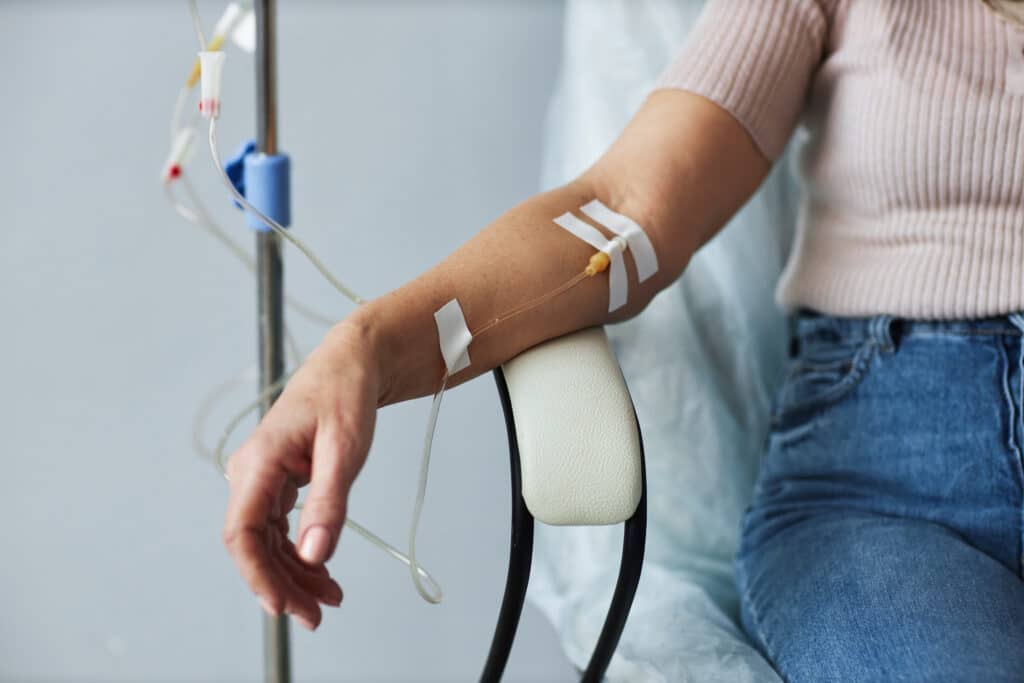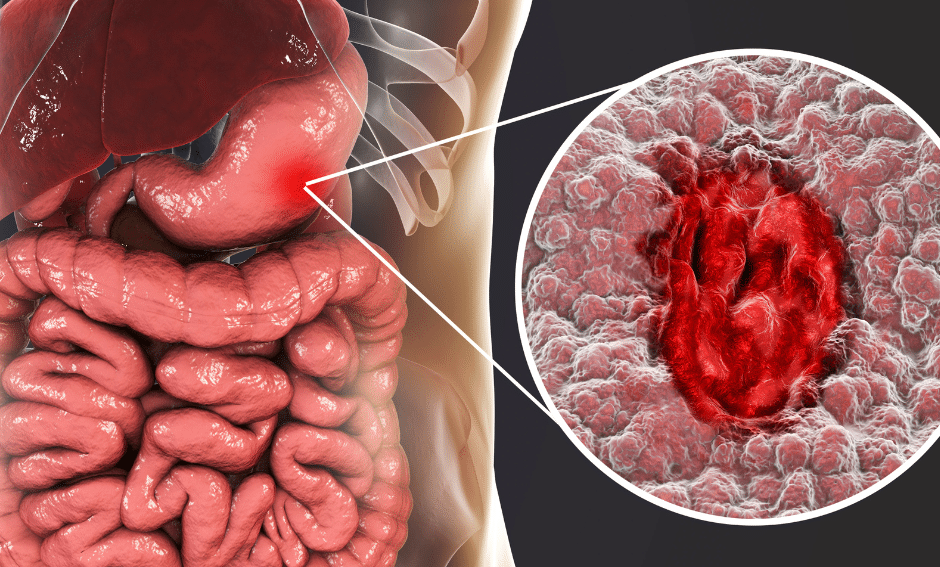Liver Cancer Awareness Month: Learn More from DHC

Learn More About Liver Cancer During Liver Cancer Awareness Month
At Digestive Healthcare Center, we strive to keep our patients aware of all manner of conditions so they can recognize the symptoms early on and receive a diagnosis and subsequent treatment as quickly as possible. One such condition is liver cancer, also known as hepatic cancer. The liver is the largest organ in the body and lies under your right ribs. It performs many important functions for your body, including breaking down and storing nutrients, controlling the clotting factors of your blood, and delivering bile to the intestines. Liver cancer can either start in the liver (primary) or spread to the liver from cancer in another organ (secondary), such as the colon, lung, or breast. The liver is made up of several different types of cells, making it possible for different types of tumors to form there. According to the American Cancer Society, incidence rates of primary liver cancer have more than tripled since 1980, and it is a leading cause of cancer deaths worldwide. October is Liver Cancer Awareness Month – keep reading to learn more about this condition from Digestive Healthcare Center.
What are the Symptoms of Liver Cancer?
In the early stages of liver cancer, there may be no signs or symptoms present. In some cases, vague symptoms are present early on, such as fatigue, fever, night sweats, and chills. When symptoms are present, they can include:
- Pain, tenderness, and swelling in the upper right section of the abdomen
- Losing weight without trying
- Loss of appetite
- Jaundice (yellowing of the skin and whites of the eyes)
- Itching
- Nausea and vomiting
It is important to be aware of the symptoms of liver cancer so that you can get prompt medical care. Your doctor can determine the cause of your symptoms and start you on the appropriate treatment plan. The symptoms above can indicate several conditions of the liver, but whether cancer or another condition is present, early detection is key.
Risk Factors for Liver Cancer
Several risk factors can increase your chances of getting liver cancer, however, the disease does not affect everyone with these risk factors. Risk factors for primary liver cancer include:
- Gender – Men are more likely to develop liver cancer than women
- Race/ethnicity – Asian Americans and Pacific Islanders have the highest rates of liver cancer in the United States
- Certain conditions, including:
- Chronic viral hepatitis
- Cirrhosis
- Inherited metabolic diseases
- Type 2 Diabetes
- Certain rare diseases
- Lifestyle factors, such as heavy alcohol use, tobacco use, and obesity
How Can I Reduce My Risk of Liver Cancer?
You can reduce your risk of developing primary liver cancer by reducing your risk of conditions that can lead to liver cancer. One of these conditions is cirrhosis (scarring of the liver). To reduce your risk of cirrhosis, we encourage patients to limit their alcohol consumption and maintain a healthy weight. Hepatitis B and C are also connected to liver cancer. A vaccine for hepatitis B is available to almost everyone, including infants and older adults, but there is not yet a vaccine for hepatitis C. Hepatitis C can be spread through sexual partners or unsterile needles used for injection of drugs, piercings, and tattoos. Making safe choices in these situations is the best way to reduce your risk of infection.
How is Liver Cancer Diagnosed and Treated in New Jersey?
Liver cancer is often diagnosed when symptoms are already present. This may be the only reason someone suspects that something is wrong, as there are currently no widely recommended screening tests for liver cancer. Several tests may be used to diagnose liver cancer, including blood tests, ultrasound, CT scan, angiogram, laparoscopy, and biopsy of tissue. Treatment for liver cancer depends on factors such as your general health and the stage of cancer. In some cases, surgery is the best treatment path, and part or all of the liver is removed (and sometimes replaced). Chemotherapy may also be used, along with ablation therapy, immunotherapy, targeted therapy, or loco-regional therapy. If you have been diagnosed with liver cancer in NJ, your doctor will discuss with you your treatment options based on your unique situation and ensure that any questions you have are answered.
FibroScan in NJ – Promoting Liver Health
One of the procedures we offer at Digestive Healthcare Center is FibroScan, an innovative and non-invasive tool used for the diagnosis of nonalcoholic steatohepatitis (NASH) and other liver diseases. NASH is caused by excess fat within the liver. This condition, along with NAFLD (non-alcoholic fatty liver disease), can lead to liver cell damage, cirrhosis, internal bleeding, and liver cancer. Early detection of NASH and NAFLD through FibroScan can allow you to start treatment before the condition worsens, helping you to avoid more serious complications and conditions (such as liver cancer) down the road. FibroScan testing takes only 5 to 10 minutes and is non-invasive, simple, and painless. A probe is placed over the liver to test the velocity of a shear ultrasound wave, which is then converted into a measurement of liver stiffness. Your physician will discuss your results with you, and if needed, treatment can begin as soon as possible. Our Hillsborough office is one of the only gastrointestinal health facilities in central New Jersey to use the FibroScan, and we want to help you stay on top of your health.
How to Get Involved During Liver Cancer Awareness Month
Liver Cancer Awareness Month is meant to spread awareness about this disease so that more people can take the right prevention steps and receive an early diagnosis if cancer is present. Being aware of the condition and how it presents itself is one of the best ways to be proactive about your health, along with making healthy lifestyle choices to promote both your overall health and your liver health. We encourage you to talk to your family and friends about liver health – being an advocate is the best way to spread awareness, whether you take on that role in person or on social media. We also encourage those living with a liver condition to talk about their experience whenever possible to raise awareness and make connections with other people living with the same or similar conditions.
Comprehensive Digestive Health Care and FibroScan in NJ at DHC
At Digestive Healthcare Center, we give those in NJ access to a wide range of tests and procedures to promote improved digestive health and wellness. We want to help you stay on top of your health so that you can live a happier and more comfortable life. We see patients in person at our gastroenterology centers and via virtual telemedicine appointments from the comfort of their homes! This makes it easy for patients to stay on top of their digestive health all year long. If you are experiencing symptoms that cause you discomfort or concern, don’t hesitate to contact us to schedule an appointment with one of our NJ gastroenterologists today. We look forward to helping you maintain positive digestive health.
Make an Appointment for Comprehensive Digestive Care in NJ
At Digestive Healthcare Center, we want each patient at our three offices in New Jersey to feel confident about their digestive health. We encourage you to contact us today to make an appointment with one of our expert gastroenterologists – don’t wait to start putting your digestive health first!
Recent Blogs
Learn more about all things digestive health and wellness by checking out our recent gastroenterology blogs.

Infusion therapy has become a vital treatment option for individuals with Crohn’s disease, offering relief when traditional medications may fall short. This method delivers medication directly into the bloodstream, providing quicker and more targeted effects to help manage inflammation, reduce symptoms, and improve quality of life. For those with moderate to severe Crohn’s disease, infusion […]

The Advancement of Ulcerative Colitis Treatment Ulcerative colitis (UC) is a chronic inflammatory bowel disease (IBD) that affects the lining of the colon and rectum. Those diagnosed with UC often experience flare-ups that can significantly impact their quality of life. Fortunately, advancements in medical treatment have made managing this condition more achievable. One option is […]

Diverticular disease and diverticulitis are related digestive health conditions that affect the large intestine (colon). With diverticular disease, small, bulging pockets develop on the lining of the colon. When these pockets become inflamed or infected, the condition is called diverticulitis. They are very common – especially after age 40 – and rarely cause problems. At […]
























